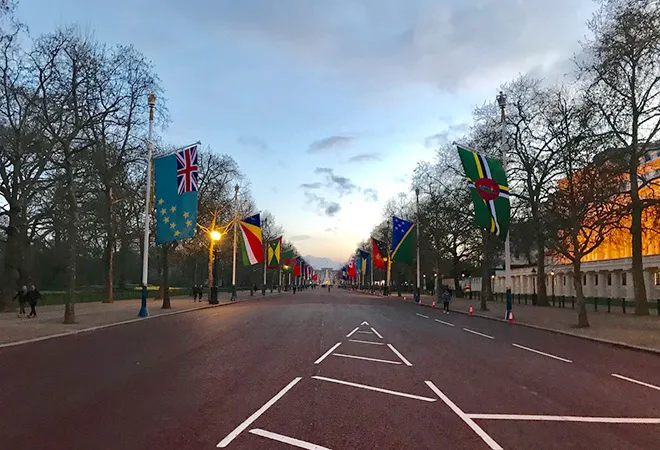
With the upcoming 25th Commonwealth Heads of Government Meeting (CHOGM) in London (16-18 April), the Commonwealth of Nations is gaining renewed attention. The group is at a crossroads now: will it cease to exist or will it be an enterprise that shapes the global agenda? The future relevance of the forum is in question, and will depend on its ability to catalyse interest and meet the needs of its members.
Below are three propositions for a path of renewed significance for 2018 and beyond.
A decentralised leadership model
To revitalise interest and commitment, the Commonwealth desperately needs to decentralise leadership. A London-centric governance structure leaves little hope for a more ambitious future. An ‘uberization’ of power and decision making should be at the center of upcoming discussions.
Such a model would allow members to play more profound roles in areas they are most invested in. India, for example, stands to benefit from taking on a more prominent role. As it stands, India accounts for around a quarter of internal trade, 55 percent of the Commonwealth population, and is the fourth largest financial contributors to the group. A devolution of responsibility around trade for example, would provide greater motivation for its renewed participation.
In addition, a clustered approach to leadership should be fostered, which allows constellations of member countries with aligned interests to collectively take ownership over various elements and aspects of the forum. That is, small island nations, for example, which account for 24 of the groups 53 members can come together around issues of mutual importance. While countries with a stake in solar, security, connectivity and so forth, can collectively drive efforts in these areas.
The nature of an ‘uberized’ and clustered model would mean a matching of mutual interests that would provide impetus for greater commitment among members.
A new constituency of support
The Commonwealth must find a way to leverage its common language, its cultural ties and the energy of its youth. The group needs to reinvent it’s overarching story and idea for a new generation. Existing geographic and digital linkages between member countries should be a catalyst for achieving this. Public indifference about the Commonwealth must be countered with a persuasive case for the group as an effective multilateral institution that cultivates symbiotic relationships between its members.
A central point of deliberation should therefore be on how it can become relevant for a new, more connected, digital generation. Sixty percent of the Commonwealth’s population of 2.4 billion is below the age of 29. Nearly a third of the global population between the ages of 15 and 29 live in Commonwealth countries. Without viewing this new generation as having a key stake in the Commonwealth, its importance and potential will inevitably dissipate with the older generations that champion it.
Beyond rituals
The Commonwealth will not become an overarching trade bloc, security, or political alliance, but can it be a forum for proposing solutions to key global issues? This would require moving beyond rituals and defining areas of convergence among members on key normative questions and issues.
As a group of countries at various stages of development, the articulation of collective visions could be a powerful tool in shaping the global agenda. As a propositional forum of solutions, the group could define collective visions on questions of global importance such as cyber security, the digital economy, the management of ocean resources, and international development.
There are two likely paths ahead for the Commonwealth. The first possibility is that the group’s relevance further diminishes, and the group ceases to exist altogether. A more compelling possibility, is one in which the Commonwealth, led by its members becomes an important global enterprise. In order to realise such an opportunity, decentralisation of power, re-evaluation of its key stakeholders and ambitious efforts to define solutions to key normative questions will be essential. The upcoming meeting is an occasion for deliberating on how to feasibly achieve this.
(Priya Dua is a Research Intern at ORF Delhi)
Murthy, C.S.R. (2018). ‘India and the Commonwealth: Redirecting the Relationship’. Carnegie India.
-- (2018). ‘Fast Facts: The Commonwealth: A Briefing for Journalists’. The Commonwealth.
Insights from ORF’s Conference on Re-Imagining the Commonwealth Road to CHOGM-2018
-- (2018). ‘Fast Facts: The Commonwealth: A Briefing for Journalists’. The Commonwealth.
Insights from ORF’s Conference on Re-Imagining the Commonwealth Road to CHOGM-2018
The views expressed above belong to the author(s). ORF research and analyses now available on Telegram! Click here to access our curated content — blogs, longforms and interviews.




 PREV
PREV

